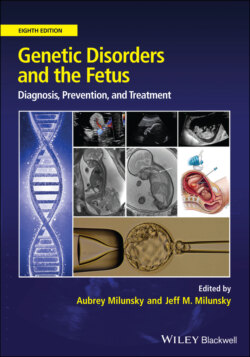Читать книгу Genetic Disorders and the Fetus - Группа авторов - Страница 148
Placental insufficiency
ОглавлениеPlacental insufficiency is the situation whereby the placenta does not deliver an adequate supply of nutrients and oxygen to the growing fetus. It is associated with adverse pregnancy outcomes, including FGR, maternal PE, and PTB. Constitutional chromosomal abnormalities such as triploidy, trisomy 13, or trisomy 18 are commonly associated with placental insufficiency, but would normally be diagnosed through amniocentesis or fetal abnormalities detectable on ultrasound. The most common known genetic cause of FGR in an otherwise normally developed fetus with normal chromosomes at amniocentesis is confined placental mosaicism (CPM) (discussed further in “Developmental considerations in confined placental mosaicism”). Genomic imbalance (i.e. altered ratio of maternal and paternal haploid genomes) is also associated with a variety of adverse pregnancy outcomes. Epigenetic changes can be observed in placentas from complicated pregnancies, though these are more likely consequences than causes of placental pathology.
